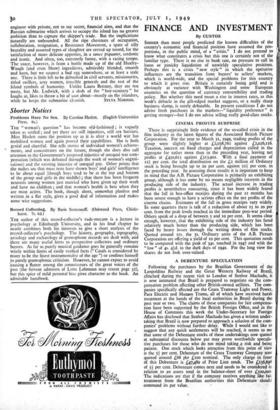Shorter Notices
THE "woman's question" has become old-fashioned ; is vaguely taken as settled ; and yet there are still injustices, still sex barriers. Miss Haslett sums the position up as it is after a world war has mobilised women and again proved their capabilities. She is both genial and cheerful. She tells stories of individual women's achieve-
' mcnts, and concentrates on the future, though she does also call attention to the Government's proposed injustice of unequal war com- pensation (which was defeated through the work of women's organi- sations) and the existing injustice of unequal pay. Other points that she makes arc that mass tests have shown boys' and girls' intelligence to be about equal (though boys tend to be at the top and bottom of the group and girls in the middle); that there has been frequent neurosis among women just married who have given up their work and have no children ; and that women's health is best when they arc most active. The book, though short, somewhat planless and written in a flat style, gives a good deal of information and makes some wise suggestions.






































 Previous page
Previous page